British Columbia gov’t literally between a rock and a hard place

By Ellsworth Dickson
With the current Gitxaala Nation case before the BC courts regarding mineral exploration, the British Columbia government is in an awkward position. On one hand the provincial NDP government wants to respect the United Nations Declaration on the Rights of Indigenous Peoples (UNDRIP) to which it adopted in 2019 and, on the other hand, it wants to encourage mineral exploration as it is part of the important mining sector that creates much employment and generates wealth and tax revenues.
The +2,000-member Gitxaala Nation, whose traditional territory is on the northwestern coast of British Columbia about 60 km south of Prince Rupert. The Indigenous group is seeking two outcomes from the court: first, the overturning of legally staked mineral claims on Banks Island, a large island off the northwest coast, and, secondly, a declaration that the current BC online mineral titles registry system is unconstitutional, outdated and inconsistent with UNDRIP. The Banks Island mineral claims were staked without consultation or consent – as are thousands of other claims.
The Gitxaala Nation considers the way mineral claims are staked to be outdated and unfair. Today, any BC resident 18 years or older can easily acquire a Free Miner Certificate and stake mineral claims on Crown land for $1.75 per hectare. However, this is just the beginning. After staking, the prospector or exploration company must pay for permitting, renewals, sometimes helicopters, airborne and ground geophysics, development and, eventually, mining. Just the exploration process can cost several million dollars.
Exploration and mining is a capital-intensive business. Where does all this money come from? In the case of a prospector, it’s out of his pocket. In the case of a junior exploration company seeking a good mineral project, funds are usually arranged by private placements. They can’t raise too much money via private placement or their stock will suffer share dilution and hamper potential capital gains. Typically, after exploring a property as much as possible on their own, prospectors will sell their claims to an exploration or mining company.
Here in Canada, we are fortunate to have stock exchanges that are amenable to mineral companies raising large sums of exploration, development and mining funds.
However, prospectors and exploration companies have other concerns regarding the Gitxaala Nation legal challenge. If a prospector or exploration company has to consult and seek consent from a First Nation, what kind of security is there for keeping their proprietary geological knowledge confidential? Many prospectors and exploration companies don’t want their valuable geological data “out there” where who knows could use it to their advantage – especially before their proposed claims are even staked.
If the Gitxaala Nation wins this case, they and other BC First Nations that want to follow in their footsteps will need to develop a reasonable, affordable and workable way of considering claim applications. This comes down to confidence. BC’s exploration industry needs to be confident that any future claim staking system will work for them.
BC Premier David Eby has said that there was $740 million spent on mineral exploration in B.C. in 2022 – a record – and mineral production in B.C. is also expected to be a record: $18.2 billion. That’s a $4.3 billion increase over 2021.
As you can see, the stakes are huge and many BC jobs depend on a healthy exploration sector. There must be a workable solution that both First Nations and the BC exploration and mining industry can agree on.
